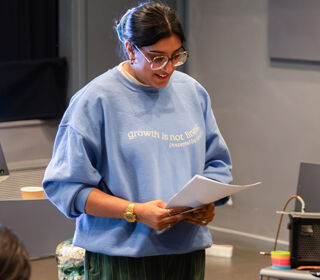
Blog

Roo has studied at BCU all the way from her BA, MA, and now her PhD. After a five year break from university education, working in supermarket operations, and personal challenges along the way, she rediscovered her passion for academia and creativity.
Her research explores cultural dysphoria and critical race theory, challenging identity perceptions for women artworkers of British South Asian descent.
Almost at completion for her PhD, Roo has gained national recognition through major awards, commissions and exhibitions through perseverance and the support of BCU.
“I have studied at BCU from Bachelor’s Level. In 2014, I graduated from my Bachelors, and I would never have imagined that I’d be returning to complete not only a Master’s Degree but also a PhD and both of the latter with scholarships too.
After not doing as well as I hoped on my BA, I took 5 years out and worked at a supermarket in operations and management. This experience gave me the maturity and focus I needed in life and I excelled in these positions very quickly. So why did I go back to university?
I missed being creative and analytical. With new life experience, I wrote an application for my Master’s degree and applied for a scholarship, knowing full well that my BA grade may impact my chances of being accepted. Yet, I was not only accepted onto the course in 2019, but I was awarded the prestigious Gertude Aston Bowater Award which covered the full fees of my course; I was delighted.
In my application I wrote about my life experience. During the five years in employment, I suffered great tragedies and traumas and just about survived a life threatening experience. It made me appreciate my life and I decided to give something I love - the arts- another chance.
I graduated at Master’s level in 2020 amidst the COVID-19 pandemic with a distinction in Fine Art Research Practice. It was a tough year as I had to shield as a clinically vulnerable person and had no access to the art school workshops. I was devastated, but did not want to let that defeat my chances of becoming an artist again, so I made do with whatever I had at home during the pandemic.
I became extremely resourceful, and this is now the backbone of my artistic practice. After a year out of education, I applied for the Midlands4Cities Doctoral Training Partnership and was successful. I’m now near completion of my PhD, which is a continuation of my Master’s Research Practice.
I am very thankful to have been given the opportunity by BCU to restart my career as an artist. It has not been easy, and challenges continued to grow in my life with health precarity and more uncertainty. One thing has been a constant though, and that is the encouragement I have had from BCU wellbeing team and my tutors in progressing in my career.
In the last 5 years since re-joining BCU, I have been awarded the Tate Liverpool Student Award (2020), a DYCP grant by Arts Council England in early 2021, my work was acquired for the in 2022.
I was nominated for the and , a major national touring exhibition that presents new commissions by 10 early-career artists from across the UK, providing a distinctive snapshot of current artistic concerns and approaches in the visual arts both in 2023. In 2024, I was awarded , I received a fellowship from , awarded by Hans Ulrich Obrist.
I launched my own publishing press this year called Jalebi Press and released my first publication, which was funded through Kickstarter and back. I have shown work nationally in extensive solo and group shows and have been commissioned by , , and Turner Prize Nominee, Project Artworks. It has been a surreal 5 years. I know that studying and pushing my practice has only been possible by studying at BCU.
About my research
My research contributes to the field of Fine Art Practice, Cultural Studies and Critical Race Theory. My research project explores the effectiveness of Cultural Dysphoria as both a methodological and theoretical model.
In 2017, non-binary scholar and artist, Ayesha Sharma, wrote a blog expressing their concerns around their reality of projected cultural identities. Cultural Dysphoria according to Sharma is, ‘the dissonance between the social expectations of an individual’s cultural performance or identity, and their desired embodiment of that culture, or uncertainty about where they fit into existing cultural categories’.
Working from this definition, I set about challenging misconceptions of artwork and women artworkers of British South Asian descent (BAWA), by exploring ideas of “cultural identity as a social performance” within art practice, whether that is something that is projected onto oneself or by society and systems.
- My research asks the following: How can a speculative arts practice that embraces unknowability, present a critical, embodied understanding of “Cultural Dysphoria" as a methodology?
- As a form of dissonance related to identity formation, in what ways can “Cultural Dysphoria” be developed as a theoretical model?
- In relation to BAWA, to what extent can Cultural Dysphoria (as methodology and theory) deconstruct discourses on art practice, intersectionality and institutional structures and systems?
Ultimately, I really care about this research because it could offer autonomy over the way art is produced. It could also impact other fields, such as Cinema, Literature, and Design, and work to deconstruct practices of categorisation. This way we move beyond structures of representation and towards a more complex picture of racialised and gendered workers in the arts and humanities.”